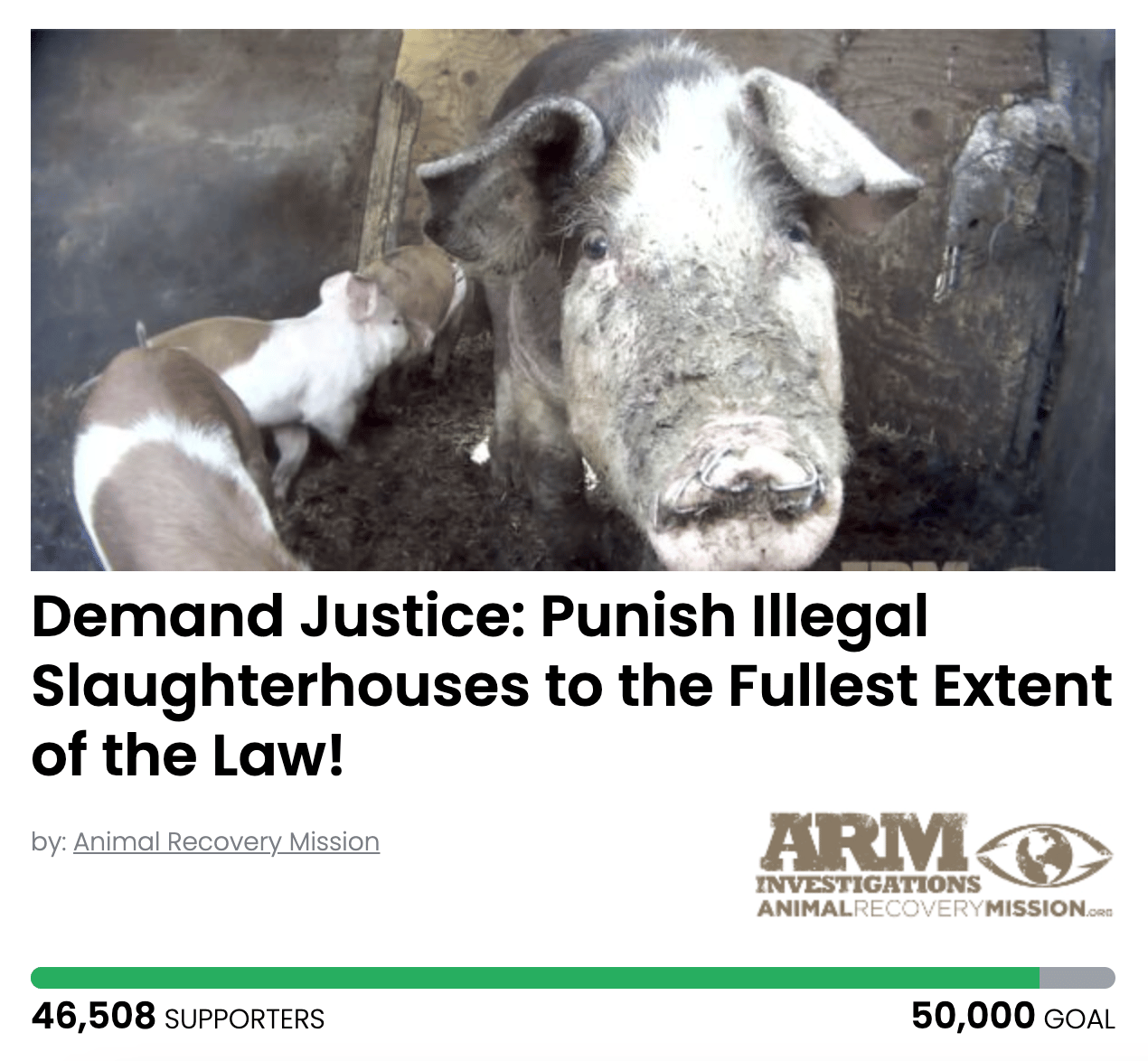Stop Illegal Slaughterhouses
Sign the petition today and make a difference in an animal’s life!*
*If you have already signed the linked petition, a different petition will load
Stop the Shadows: Why Illegal Slaughterhouses Demand Immediate Action
Illegal slaughterhouses lurk in the shadows, posing a massive, multi-faceted threat that reaches far beyond the boundaries of the facility itself. They operate outside the law, completely unregulated, and the consequences ripple through our food safety, animal welfare, environmental health, and even social justice. Stopping illegal slaughterhouses isn't just a matter of enforcing the law; it's a critical imperative for public safety and ethical standards.
The Poison on the Plate: A Public Health Nightmare
When meat comes from an illegal source, you're not just taking a risk—you're playing Russian roulette with your health. The absence of mandatory health inspections and hygiene standards creates a perfect breeding ground for dangerous pathogens.
Disease Transmission: Without veterinary inspection (ante-mortem—before death—and post-mortem—after death), sick animals can be slaughtered, and their meat sold. This poses a severe risk of zoonotic diseases (diseases that can jump from animals to humans), including tuberculosis, E. coli, Salmonella, and parasitic infections.
Contamination Galore: Illegal facilities almost universally lack basic sanitation—proper plumbing, clean water, adequate refrigeration, and sterilized tools. This leads to fecal and microbial contamination of the meat, making it highly unsafe for human consumption.
Chemical Hazards: Unregulated operations may use unapproved or excessive chemicals, hormones, or antibiotics in their animals, which can also end up in the final product, creating long-term health concerns.
A Cruel Injustice: Animal Welfare Abandoned
In legal, regulated abattoirs, basic, albeit minimal, animal welfare standards are required. In illegal slaughterhouses, this is universally absent, leading to appalling and gratuitous cruelty.
Brutal Conditions: Animals are often transported and held in filthy, overcrowded, or abusive conditions, suffering severe stress and injury before slaughter.
Excruciating Slaughter: Without trained staff and proper stunning equipment, the slaughter methods are often barbaric, prolonging the animal’s suffering. Animals may be inhumanely restrained, conscious throughout the process, or subject to repeated, failed attempts at stunning, resulting in prolonged and excruciating deaths.
Pollution and Degradation: Environmental Chaos
The way illegal facilities dispose of waste is a major source of environmental contamination, often poisoning local communities.
Toxic Waste Disposal: Unlike regulated slaughterhouses that must process or contain by-products, illegal operations routinely dump untreated blood, offal, bone, and animal waste directly into open fields, local water bodies, or public drainage systems.
Water and Soil Contamination: This haphazard dumping pollutes water sources (rivers, streams, groundwater) and soil, making it unsafe for residents and devastating local ecosystems.
Air Quality: The resulting decomposition and decay create a horrible stench and attract vermin, severely degrading the air quality and general living conditions for people in the vicinity.
The danger of illegal slaughterhouses isn't limited to the meat and the environment; it extends to the vulnerable people forced to work there and the communities they live in.
Dangerous Working Conditions: Workers often face extremely hazardous environments—slippery floors, dangerous equipment, no safety gear, and exposure to pathogens—leading to high rates of severe injuries and infections.
Exploitation: These operations frequently rely on vulnerable workers who are denied basic labor rights, work long hours for minimal pay, and have no recourse for injury or illness.
The Call to Action
The issue of illegal slaughterhouses is a complex web of public health risk, animal suffering, environmental disregard, and human rights abuse. Addressing it requires a coordinated, multi-pronged effort:
Stricter Enforcement: Authorities must actively seek out, shut down, and impose severe penalties on all illegal operations.
Public Awareness: Consumers must be educated on the risks of buying meat from unverified sources and should demand traceable, inspected products.
Support Legal Alternatives: Providing regulated, sanitary, and humane small-scale slaughter services, especially in rural areas, can reduce the need for illegal operations.
By taking decisive action, we can protect our health, uphold ethical standards for animals, safeguard our environment, and ensure basic rights for all workers. The shadows must be cleared, and accountability must prevail.

